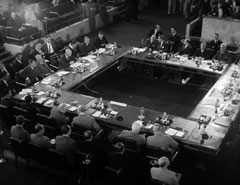70 years of the Geneva Summit
No less than the leaders of the Great Powers gathered in Geneva. On July 18 1955 the summit of the «big four» began: US-President Dwight D. Eisenhower, the Soviet Minister President Nikolai A. Bulganin as well as Antony Eden and Edgar Faure, the British and French Prime Ministers, convened in the international city.
«Warm Welcome» by the President of the Federal Council
Negotiations took place between July 18 and July 23 – initially on the level of heads of government, later among the foreign ministers John Foster Dulles, Vyacheslav M. Molotov, Harold Macmillan and Antoine Pinay – and covered the issues of European security, disarmament and German reunification. To ensure the safety of the top-level conference delegates, the canton of Geneva together with the Swiss confederation provided large numbers of security personnel (dodis.ch/12794). Upon arrival, the heads of government were greeted by President of the Federal Council Max Petitpierre (dodis.ch/13176). Eisenhower later thanked for the «warm welcome» in a personal letter (dodis.ch/12854).
Hopes for Peace and Prosperity
On July 21, the Federal Council held a dîner in the Palais Eynard in Geneva at which the «big four» and their foreign ministers were also joined by UN secretary general Dag Hammaskjöld, the Soviet party leader Nikita Khrushchev, numerous ministers, diplomats and military officers as well as the presidents of the two chambers of the Swiss Federal Parlament and the mayor of Geneva (dodis.ch/12856). In his toast to the guests, Petitpierre expressed the hope that «you will be carried by the trust of those who, across national states, hope fervently that the summit is a turning point, […] the beginning of a time, in which peoples and governments overcome their differences and unite their efforts in a common fight for peace and prosperity» (dodis.ch/12855, original in French).
Irreconcilable Differences despite «détente»
It was the climax of the so-called «policy of détente» in the early phase of the Cold War: In Korea in 1953, the opposing forces succeeded to agree upon a truce and in 1955, Austria was granted independence as a neutral state. However, the amicable «spirit of Geneva» was not able to prevent that the opinions of the conference delegates diverged diametrically. No agreement could be found in any of the essential agenda items. In autumn, Petitpierre retrospectively described the «euphoric atmosphere» as «peculiarly artificial» (dodis.ch/32114, original in French).
The Future of the «Spirit of Geneva»
In October of 1955, the «spirit» of the July conference was put to the test during a new conference of foreign ministers of the Great Powers in Geneva (dodis.ch/10955). Again, no concrete results were achieved. The secretary general of the Federal Department of Foreign Affairs Alfred Zehnder composed an analysis of the international state of affairs for his principle Petitpierre that he was able to base on personal talks with Pinay (dodis.ch/12434) and Macmillan (dodis.ch/13134): «We may have believed that the almost human behavior of the Soviets implied the Russian surrender to the West». However, Zehnder continues, it should be clear that this point in time is still far away.
Nonetheless, the chief diplomat was hopeful: «The spirit of Geneva thus is no specter but a fruitful idea and like any idea, the spirit of Geneva needs time to enter the policy of the involved countries» (dodis.ch/10994, original in French).
